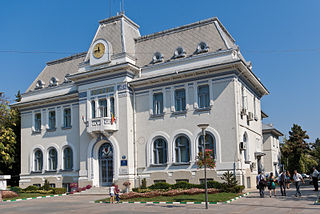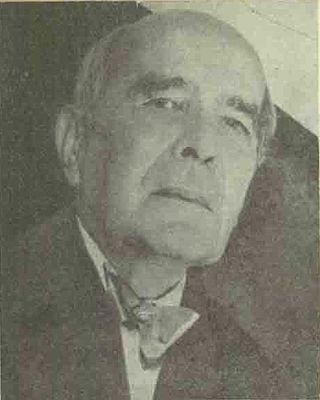Monalisa Basarab | |
|---|---|
| Born | April 23, 1972 |
| Nationality | |
| Occupation | actress |
| Years active | 1995 - present |
Monalisa Basarab [1] (born 23 April 1972, Tulcea) is a Romanian theater and film actress.
Monalisa Basarab | |
|---|---|
| Born | April 23, 1972 |
| Nationality | |
| Occupation | actress |
| Years active | 1995 - present |
Monalisa Basarab [1] (born 23 April 1972, Tulcea) is a Romanian theater and film actress.
She graduated in 1995 from Babeș-Bolyai University of Cluj-Napoca, [1] Faculty of Theater and Television, acting specialization, in the class of professor Sorana Coroamă-Stanca. Monalisa Basarab made her debut in 1995 on the stage of the Oradea State Theater where she had various roles until 1998. [1] From 2000 to 2002 he was part of the Nottara Theater troupe. She has been an actress at the Constantin Tănase Magazine Theater in Bucharest since 2002. [1] [2]
Among the roles played in the theater are: the daughter of the colonel Afară în fața ușii by Wolfgang Borchert, directed by Sergiu Savin; The Young Woman in Frumos e în septembrie la Veneția [3] [4] by Teodor Mazilu, directed by Nicolae Scarlat, as well as characters from Idolii femeilor, directed by Bițu Fălticineanu. [5]
He made his film debut in 1999 in the ZDF/ARTE/Ifage Wiesbaden episode "Nostradamus-Prophet des Untergangs" in the documentary TV series Sphinx-Geheimnisse der Geschichte, directed by Klein Günther, in which he played Nostradamus' wife.
He appeared in international co-productions in the pilot episode of the action TV series Élodie Bradford [6] in which he starred opposite Anthony Delon; as Princess de Galathionne in the TV movie directed by Lionel Bailliu, Moș Goriot (Le Père Goriot) after the novel of the same name by Honoré de Balzac, as Severine Faussait in the 2003 episode directed by Laurent Carcélès, "Corps et Âmes", Vertiges [7] [8] [9]
In The Way I Spent the End of the World [10] [11] directed by Cătălin Mitulescu, a film that participated in the Cannes Film Festival and won the award in the Un Certain Regard section for the best actress (Dorotheea Petre), played the teacher lualalilu, the main character. [1]
The poet Ilie Marinescu launched the volume of poems Muguri de stele at Proxima publishing house in 2007, [12] a volume accompanied by a audiobook on CD that includes the poems in the volume in the reading of the actors Monalisa Basarab, Ion Lucian, Paula Sorescu Lucian, George Mihăiță, Adriana Trandafir and the author of the book.

Pitești is a city in Romania, located on the river Argeș. The capital and largest city of Argeș County, it is an important commercial and industrial center, as well as the home of two universities. Pitești is situated in the historical region of Muntenia. It lies on the A1 freeway connecting the city directly to the national capital Bucharest, being an important railway junction, with a classification yard in nearby Bălilești. The city houses the Arpechim oil refinery, and is a marketing center for the automotive industry, in particular, Automobile Dacia.
Standard Romanian shares largely the same grammar and most of the vocabulary and phonological processes with the other three surviving varieties of Eastern Romance, namely Aromanian, Megleno-Romanian, and Istro-Romanian.

Luminița Gheorghiu was a Romanian film actress, and artistic performer in East Central Europe. She achieved international recognition for her roles in The Death of Mr. Lazarescu (2006) and Child's Pose (2013). Gheorghiu's roles were mostly in Romanian and French, including that in Code Unknown with Juliette Binoche.
Valentin Plătăreanu was a Romanian actor, director and drama teacher.

Păcală is a fictional character in Romanian folklore, literature and humor. Primarily associated with Transylvania and Oltenia, he is depicted as a native of Vaideeni, located in an area of contact between those two regions. An irreverent young man, seemingly a peasant, he reserves contempt and irony for the village authorities, but often plays the fool, or displays an erratic and criminal behavior that scholars attribute to the eclecticism of sources weaved into the narrative. Păcală seems to be at least partly modeled on other characters in European folklore, in particular Giufà and Till Eulenspiegel. He may therefore be borrowed from Western chapbooks, with scholar Traian Bratu hypothesizing that Romanians were introduced to the Eulenspiegel anecdotes by their prolonged contact with the Transylvanian Saxons. The stories were then adapted and, in at least some cases, substantially modified, for instance by the addition of a native mythological layer, and by the appearance of a sidekick, the more slow-witted Tândală.

Haralamb George Lecca, also known as Haralamb Leca, Har. Lecca, or Haralambie Lecca, was a Romanian poet, playwright and translator. He belonged to an upper-class family, being the grandson of artist Constantin Lecca and brother of genealogist Octav-George Lecca, as well as nephew and rival of writer Ion Luca Caragiale. He had an unsettled youth, studying medicine and law for a while, and also reaching a Sub-Officer's rank in the terrestrial army. He debuted in literature under the guidance of Bogdan Petriceicu Hasdeu, who also employed Lecca's services as a medium. His early work was in poetry, often outstandingly macabre, evidencing his familiarity with 19th-century French literature and hinting at a vague affiliation with Symbolism. Briefly a collaborator of Junimea society, then of its dissident wings, Lecca never joined the fledgling Symbolist movement, and spent his later life in relative isolation from all literary circles.

Adrian Maniu was a Romanian poet, prose writer, playwright, essayist, and translator.

Profira Sadoveanu, also credited as Profirița and known after her marriage as Sadoveanu Popa, was a Romanian prose writer and poet, noted as the daughter, literary secretary, and editor of the celebrated novelist Mihail Sadoveanu. She was born during her father's stay in Fălticeni, on the traditional border between Western Moldavia and Bukovina, and is sometimes regarding as belonging to a Bukovinan literary tradition. She had fond memories of the place, where she had a carefree childhood on her paternal estate. During the campaigns of World War I, the family relocated to the urban center of Iași, purchasing a villa on Copou Hill. Profira's adolescence saw her socializing with some major figures in Romanian literature, who were friends of her father. Her own debut as a poet, in the 1920s, was overseen by George Topîrceanu.

Adolf Edmund George de Herz, commonly shortened to A. de Herz, also rendered as Hertz and Herț, was a Romanian playwright and literary journalist, also active as a poet, short story author, and stage actor. He was the scion of an upper-class assimilated Jewish family, with its roots in Austria-Hungary. His grandfather, Adolf Sr, was a controversial banker and venture capitalist, while his father, Edgar von Herz, was noted as a translator of Romanian literature. Adolf had a privileged childhood and debuted as a poet while still in high school, producing the lyrics to a hit romance. In his early work for the stage, Herz was a traditionalist inspired by Alexandru Davila and the Sămănătorul school, but later veered toward neoclassical literature and aestheticism. His "salon comedies", staged by the National Theater Bucharest, borrowed from various authors, including Roberto Bracco, Henri Lavedan, and Haralamb Lecca, peaking in popularity in 1913, with Păianjenul. By the start of World War I, Herz was also a writer of revues.
The current structure of the Romanian Land Forces is as follows:

Mircea Constantin Demetriade was a Romanian poet, playwright and actor, one of the earliest animators of the local Symbolist movement. Born in Oltenia to a theatrical family, he largely gave up on a similar career to become a bohemian writer. He associated with, and was inspired by, Alexandru Macedonski, building on early romantic influences at Literatorul magazine. Later, he incorporated borrowings from Charles Baudelaire and Arthur Rimbaud, two of the authors Demetriade would translate into Romanian.

Elections for the ad hoc Divan were held in Wallachia in September 1857. They restored a liberalizing trend that had been repressed following the 1848 revolution, also giving expression to the national awakening that was taking part among the Romanians. The toppling of the conservative Regulamentul Organic regime in both Danubian Principalities made them possible: following the 1856 Treaty of Paris, Wallachia and Moldavia functioned as a protectorates of the European powers; both were also clients of the Ottoman Empire. Excluding the spontaneous rallies of 1848, this was the first public consultation to be held in eleven years. It ran in conjunction with the Moldavian Divan elections, and, like them, had unusually lax criteria for participation, allowing peasants and guilds to vote by indirect suffrage.
Events from the year 2018 in Romania.

Alexandru Pompiliu Gâlmeanu is a Romanian photographer and image director. He started working in 1998, and has primarily focused on editorial, advertising, fashion or abstract photography.
Events from the year 1961 in Romania. The year saw the creation of the title of President of the State Council for the de facto head of state. The first office holder was Gheorghe Gheorghiu-Dej, who was already General Secretary of the Romanian Communist Party.
The tenth season of the Romanian reality talent show Vocea României premiered on ProTV on September 9, 2022. Irina Rimes and Tudor Chirilă returned as coaches, while Denis 'The Motans' replaced Horia Brenciu. Smiley was joined by Theo Rose, for the first time in the history of the contest there being a double-coached team. Meanwhile, Pavel Bartoș returned for his tenth season as host. Iulia Pârlea acted as the green room host during the live shows.

Teambuilding is a 2022 Romanian comedy film directed by Alex Cotet, Matei Dima & Cosmin Nedelcu and written by Cotet. It stars Matei Dima and Cosmin Nedelcu accompanied by Anca Dinicu, Nicu Banea, Șerban Pavlu, Roxana Condurache, Cristi Pulhac, Monica Odagi and Nuami Dinescu. It was released on September 30, 2022, in Romanian theaters.

Snow, Tea and Love is a 2021 Romanian science fiction comedy film directed by Cătălin Bugean and written by Andreas Petrescu. It is the first science fiction comedy film production made in the country. Starring Alecsandra Timofte Revnic, Alex Velea, Alina Pușcău, Anca Dinicu, Andreas Petrescu, Angel Popescu, Carmen Tănase, Cătălin Bugean, Cosmin Seleși, Cristian Iacob, Dan Negru, Dorian Popa, Dragos Dumitru, Florin Busuioc, Ioana Mihail Tiberiu, Iuliana Luciu, Levent Sali, Liviu Vârciu, Marin Barbu, Monica Anghel, Paula Chirilă, Pepe, Raluka, Sergiu Costache and Sorin Bontea.